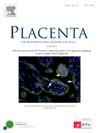由母体COVID-19疾病确定的胎盘转录组谱包括让人想起先兆子痫的改变
IF 3
2区 医学
Q2 DEVELOPMENTAL BIOLOGY
引用次数: 0
摘要
导言在大流行的最初阶段,孕期感染 SARS-CoV-2 与不良妊娠结局和胎盘改变有关。对于感染 COVID-19 孕妇的胎盘异常是否会在感染后持续存在,目前的研究还很少。在此,我们确定了在母体感染 COVID-19 后没有出现产科并发症(包括子痫前期)是否伴随着胎盘生理机能的完全恢复正常。方法:从 SARS-CoV-2 阳性母亲的胎盘样本中纯化胎盘 RNA,样本取自 2022 年,当时 Omicron 是主要的关注变体(称为 Omicron)(n = 21);或取自大流行前的健康孕妇(称为 preCOVID-19)。我们的队列包括在临产前数周甚至数月感染的孕妇样本。我们进行了 RNA-seq,确定了差异表达基因,并使用基因组富集分析法研究了这些基因所属的生物、生化和细胞通路。结果我们确定了 71 个差异表达基因(DEGs)(定义为 p 值≤0.05,折合变化(FC)≤-2 或≥2)。在患 COVID-19 疾病的母亲分娩的胎盘中发现的改变主要归因于与器官形成、细胞外基质组织和氧运输相关的通路。在排除妊娠糖尿病(GDM)样本后,也检测到了这些变化。讨论我们认为,母体感染 SARS-CoV-2 导致的基因表达改变表明胎盘存在血管缺陷。本文章由计算机程序翻译,如有差异,请以英文原文为准。

The placental transcriptomic profile determined by maternal COVID-19 disease encompasses alterations reminiscent of preeclampsia
Introduction
During initial stages of the pandemic, SARS-CoV-2 infection during pregnancy was related to adverse pregnancy outcomes and alterations in the placenta. Whether placental abnormalities in pregnant women with COVID-19 still persist afterwards remains poorly studied. Here, we determined whether the absence of obstetric complications after maternal COVID-19 disease, including preeclampsia, is accompanied by a complete return to normalcy in terms of placental physiology.
Methods
Placental RNA was purified from placental samples from SARS-CoV-2 positive mothers taken either in 2022, when Omicron was the predominant variant of concern (termed Omicron) (n = 21); or from healthy pregnancies predating the pandemic (termed preCOVID-19). Our cohort included samples from pregnant women who got infected weeks and even months before term. We performed RNA-seq, identified differentially expressed genes and examined to which biological, biochemical and cellular pathways they belong, using gene set enrichment analysis.
Results
We identified 71 differentially expressed genes (DEGs) (defined by p-value ≤0.05 and fold change (FC) of ≤ -2 or ≥2). The alterations identified in placentas delivered by mothers who suffered an episode of COVID-19 disease could be mainly attributed to pathways related to organogenesis, extracellular matrix organization and oxygen transport. These alterations were also detected after exclusion of gestational diabetes mellitus (GDM) samples. Although none of the samples were taken from cases of preeclampsia, several of the relevant DEGs have been previously reported as dysregulated in hypertensive disorders of pregnancy including preeclampsia.
Discussion
We propose that maternal SARS-CoV-2 infection causes alterations in gene expression that are indicative of vascular defects in the placenta.
求助全文
通过发布文献求助,成功后即可免费获取论文全文。
去求助
来源期刊

Placenta
医学-发育生物学
CiteScore
6.30
自引率
10.50%
发文量
391
审稿时长
78 days
期刊介绍:
Placenta publishes high-quality original articles and invited topical reviews on all aspects of human and animal placentation, and the interactions between the mother, the placenta and fetal development. Topics covered include evolution, development, genetics and epigenetics, stem cells, metabolism, transport, immunology, pathology, pharmacology, cell and molecular biology, and developmental programming. The Editors welcome studies on implantation and the endometrium, comparative placentation, the uterine and umbilical circulations, the relationship between fetal and placental development, clinical aspects of altered placental development or function, the placental membranes, the influence of paternal factors on placental development or function, and the assessment of biomarkers of placental disorders.
 求助内容:
求助内容: 应助结果提醒方式:
应助结果提醒方式:


